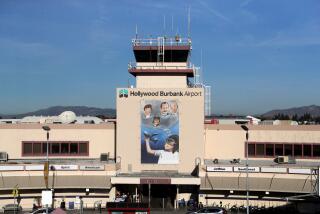Airport Tax Proposed in FAA 5-Year Plan
WASHINGTON — The Bush Administration on Monday sent Congress a $22-billion, five-year plan for commercial aviation to be funded by a new airport tax of up to $12 per round trip and 25% increases in other aviation taxes.
Federal Aviation Administrator James B. Busey said the reauthorization bill would help meet the growing demand for aviation, allow modernization of the FAA’s air traffic control system and increase aviation safety.
Overall, it would boost federal funding for aviation projects 73% in the next five years, compared with the amount available during the current five-year period.
In addition to the plan for improvements, the FAA expects to spend between $22 billion and $24 billion on operations and maintenance over the next five years, including salaries of air traffic controllers, FAA budget officials said.
The FAA reauthorization, which covers proposed capital expenditures through fiscal 1995, is the first major legislation proposed under the national transportation policy unveiled by President Bush and Transportation Secretary Samuel K. Skinner earlier this month.
The transportation policy asks users to pay more of the cost of air, land and sea transportation systems and would shift some taxing responsibilities away from the federal government to state and local governments.
The aviation plan calls for increases in some federal aviation taxes as well, although the Administration makes a distinction between “user fees” and taxes, which Bush has promised not to increase.
A federal trust fund, which is collected from passenger and shipper taxes, would pay 85% of FAA costs, contrasted with 57% now.
The fund would be bolstered by an increase in the passenger ticket tax from 8% to 10%. The tax on aviation gasoline would increase from 12 cents to 15 cents and on jet fuel from 14 cents to 18 cents.
If approved by Congress, the plan would allow airport taxes for the first time since the early 1970s.
The maximum initial tax would be $3 per departure, with travelers who make connecting flights paying at no more than one additional airport each way.
After the first year, collection of the tax would automatically decrease other federal funding available to airports, and some smaller regional airports might elect not to levy the fee so it would not reduce funding under the federal Airport Improvement Program, said Mike Moffet, an FAA assistant administrator.
If the nation’s largest 45 airports impose the ticket tax, collections are expected to total $1 billion a year, he said.
Federal funding for airport improvements would total $7.7 billion over five years--a 28% increase over amounts made available during the past five years.
Other funds under the reauthorization program would include $13.5 billion for facilities and equipment programs, a 130% increase over the previous five years, and $970 million for research and development, a 13% increase.
More to Read
Get the L.A. Times Politics newsletter
Deeply reported insights into legislation, politics and policy from Sacramento, Washington and beyond. In your inbox three times per week.
You may occasionally receive promotional content from the Los Angeles Times.










